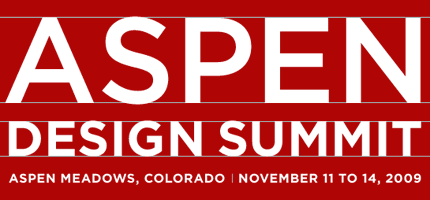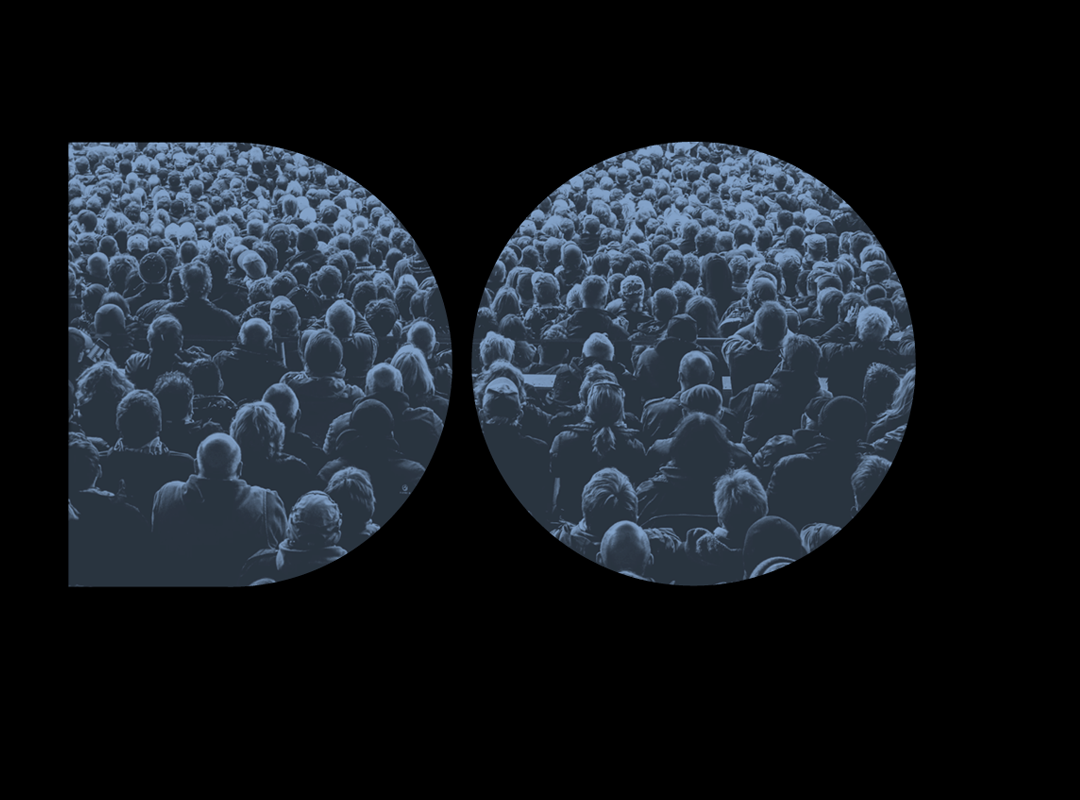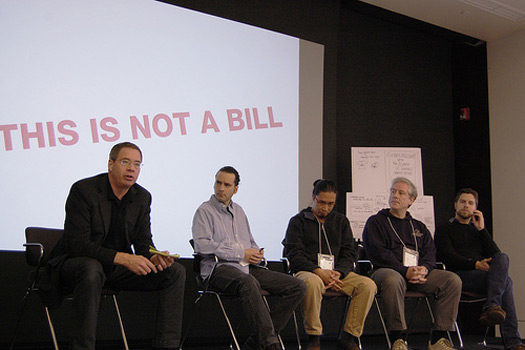
October 6, 2009
Aspen Design Summit: Program Description

This is not a conference. Instead we envision a select group of 60 designers, change leaders, NGOs, foundations and experts coming together to engage actively in opportunities to demonstrate design thinking in crafting solutions for large social problems, as well as to use existing networks and programs to accelerate change. Aspen will provide a unique, intimate setting for this work.
Our goal is to curate a series of potential projects with concrete action plans to be implemented over a two-year period, and to use these projects as demonstrations of the concept of integrative design thinking for human-centered solutions to global social issues. We are envisioning working teams against 5-6 concrete projects; curated presentations; and the chance to explore with a select group of leaders and thinkers future opportunities and models for design solutions against large themes of poverty, health care and education. We promise an intimate environment for conversation and dialogue, a forum for expansive thinking, and hard work against concrete solution-oriented programs. We expect participants to share ideas and experience, pool resources, and document best practices about how the design industry can influence and advance a social change agenda. We will not take on projects that are not actionable within a two year time frame, so we anticipate that one of the rewards of participation will be true and effective change.
Projects being developed include:
National Design Center for Rural Poverty Programs
One of the poorest regions in the U.S., Hale County, Alabama, is envisioned as a center for implementing design projects to help alleviate rural poverty. A National Design Center for Rural Poverty Programs would act as a laboratory for designers, academics, NGOs, and community groups to experience, research and collaborate on issues related to rural poverty, including health, education, housing and infrastructure. The initiative would build on the presence of groups already in Hale, such as HERO, Rural Studio, Urban Studio, Project M, and Teach for America. The goal is to devise a concept and business model for the Center, which would act as a catalyst for developing resources and programs, with the help of local and visiting design professionals, to drive economic development and social betterment in the region.
UNICEF Education Programs
This initiative is an AIGA collaboration with UNICEF to rethink approaches to two specific problems that must be overcome to provide effective support to education in developing countries. Faced with enormous challenges to advance education, UNICEF is striving to make schools safer, healthier and more conducive to learning, especially in the case of vulnerable and difficult-to-reach populations or children dislocated by disaster. This initiative will focus on two well-defined projects, each of which can address an immediate need: design a low cost, durable Early Child Education kit that can be used in emergency situations; and design clean, dignified facilities and support services for menstruating girls, so they are more likely to continue to attend classes.
CDC Public Health Programs for Older Adults
This broad-based public health education campaign, to be developed with the Centers for Disease Control, and perhaps working the AIGA network of 68 regional chapters, will address the issue of promoting healthy aging for older adults. With the number of people aged 65 or older expected to double to 71 million by 2030, this initiative will examine two key issues facing aging populations: the need to broaden the use and availability of potentially life saving preventive services; and to ensure that older adults have the information and services they need in an emergency. In both cases, we envision the collaboration of local communities.
Mayo Clinic Health & Obesity Programs
The Mayo Clinic Center for Innovation will lead an initiative around rural health care delivery systems and how design can help to impove these systems to broaden their impact, efficiency, and reach. The initiative envisions what a massive, local rural community healthcare intervention might look like.
Sustainable Food Innovation
A small but broad based revolution is taking place in the food system in the U.S., leading to a fundamental rethinking of how we produce, process, prepare, distribute and consume food. While industrialized agriculture has made more food available to us than ever before, it has come at a great cost to our health, our environment and to traditional farming methods. An obesity epidemic, especially among children, high rates of diet-related disease, and food safety crises, are among the tragic consequences. The goal of the Food Project is to identify where design interventions might change the pace, degree, or scale of food transformations already underway in order to impact the childhood obesity epidemic.
NewDesign Foundation
This project is aimed at creating a model for how foundations and NGOs can collaborate, and work efficiently and effectively, with leading design firms to foster social impact projects. Conceived at the Rockefeller Foundation Design for Social Impact Workshop in 2008, it has been incubated by Continuum and Doblin/Monitor as a collaborative initiative for leading design firms, foundations and NGOs. A concrete narrative and proposal will be presented at Aspen for further development. The project envisions that 5-10 leading NGOs will participate at the outset, to seed the project with significant challenges and professional partners.
Participants (Confirmed Attendees: list in formation 10/9/09)
Marc Alt, Principal, Marc Alt + Partners; AIGA Center for Sustainable Design
Lynda Anderson, Director, Healthy Aging Program, Centers for Disease Control
Allison Arieff, Design Columnist, The New York Times; Content Strategist, Urban Revision
Ernest Beck, Editorial Director, Aspen Design Summit
John Bielenberg, Founder, Project M
Tim Brown, CEO, IDEO
Grant Cambridge, Senior Researcher, The Meraka Institute / South Africa
Charlie Cannon, Founder, Innovation Studio, Professor of Industrial Design, RISD
Valerie Casey, Founder, Designers Accord
Ted Chen, Director for Innovation and Learning, Kellogg Foundation
Allan Chochinov, Editor, Core77
Brian Collins, President, Collins
Pam Dorr, Director, Hale County Housing Resources / Alabama
William Drenttel, Partner, Winterhouse
Vanessa Eckstein Arrioja, Principal, Blok Design / Mexico
Jaan Elias, Director of Case Research, Yale School of Management
Christopher Fabian, Communications Officer, UNICEF
Robert Fabricant, Vice President Creative, Frog
Heather Fleming, CEO, Catapult Design
Richard Grefé, Executive Director, AIGA
Chris Hacker, Chief Design Officer, Johnson & Johnson
Terry Irwin, Head of Design School, Carnegie Mellon University
Kathryn E. Johnson, Board Member, Friends of the UN’s World Food Programme
Jeremy Kaye, Creative Director, Ziba Design
Larry Keeley, Partner, Doblin/Monitor
Henry King, Global Account Manager, Doblin/Monitor
Polly LaBarre, Writer and Consultant; Co-Author of Mavericks at Work
Nicholas LaRusso, Executive Director, Mayo Clinic Center for Innovation
Julie Lasky, Editor, Change Observer
Carol McCall, Strategy and Innovation, Vanguard Health Systems
Nisa Miranda, Director, University Center for Economic Development, University of Alabama
Anna Muoio, Principal, Continuum
Sergio Palleroni, Center for Sustainable Practices, Portland State University
Jay Parkinson, Co-Founder, Hello Health
Hanne Bak Pedersen, Deputy Director, UNICEF Supply Division
Doug Powell, Principal, Schwartz Powell
Rick Robinson, Research Fellow, Continuum
Elizabeth Scharpf, Founder, Sustainable Health Enterprises (SHE)
Edgard Seikaly, Education Specialist, UNICEF Supply Division
Fabio Sergio, Creative Director, Frog Design
Sam Shelton, Principal, Kinetik Communications
Douglas Shenson, Associate Clinical Professor, Yale School of Public Health; Director, Sickness Prevention Achieved through Regional Collaboration
Amy B. Slonim, AARP Liaison, Centers for Disease Control and Prevention
Barbara Spurrier, Administrative Director, Mayo Clinic Center for Innovation
Gong Szeto, CEO, Your Own Democracy
Manuel Toscano, Principal, Zago
Inga Treitler, Terranova Group and National Association for the Practice of Anthropology
Jen van der Meer, Strategist and Activist; Chair, O2NYC
Helen Walters, Innovation & Design Editor, Business Week
Jocelyn Wyatt, Design for Social Impact Director, IDEO
Background
AIGA, which represents the largest design community in the United States, as well as leading international initiatives, is a professional design organization with 68 local chapters. This will be the third Aspen Design Summit under the auspices of AIGA. The last Summit led to initiatives including the Design for the Other 90% exhibition at the Cooper-Hewitt and the Index:|AIGA Aspen Design Challenge, a call to students worldwide to raise awareness of the need for improved access to fresh water with innovative design solutions. Richard Grefé, executive director, is co-chair of this Aspen summit.
http://www.aiga.org/content.cfm/aspen-design-summit
http://www.aspendesignchallenge.org
Winterhouse Institute will act as catalyst, coordinator and champion of an initiative in the public sphere to develop collective action and collaboration for social impact across the design industry; it will also create a communications platform for the conference, including an editorial website to monitor and report on developments. Funding for this work is through the Rockefeller Foundation. It’s websites, Design Observer, Change Observer and Places, are the leading design news, commentary and criticism publications online, and will be a resource for the distribution of outcomes from Aspen Design Summit. William Drenttel, director, is co-chair of this Aspen summit.
http://www.winterhouse.com/institute
http://www.designobserver.com
https://designobserver.com/
Observed
View all
Observed
By William Drenttel
Related Posts

Ernest Beck|Event-Aspen
Sustainable Health Enterprises Wins Prestigious Curry Stone Design Prize

Arts + Culture
Aspen Editors|Event-Aspen
Aspen Design Summit: Update 09.25.10

Helen Walters|Event-Aspen
Next: Innovation Tools & Trends Rockefeller Foundation’s Push Toward Design and Innovation

Helen Walters|Event-Aspen
Inside the Design Thinking Process
Recent Posts
Candace Parker & Michael C. Bush on Purpose, Leadership and Meeting the MomentCourtney L. McCluney, PhD|Essays
Rest as reparations: reimagining how we invest in Black women entrepreneurs Food branding without borders: chai, culture, and the politics of packaging Why scaling back on equity is more than risky — it’s economically irresponsibleRelated Posts

Ernest Beck|Event-Aspen
Sustainable Health Enterprises Wins Prestigious Curry Stone Design Prize

Arts + Culture
Aspen Editors|Event-Aspen
Aspen Design Summit: Update 09.25.10

Helen Walters|Event-Aspen
Next: Innovation Tools & Trends Rockefeller Foundation’s Push Toward Design and Innovation

Helen Walters|Event-Aspen
